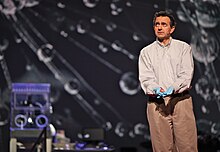Anthony Atala
| Anthony Atala | |
|---|---|

Atala on stage at TED 2011.
|
|
| Born | 1958 (age 58–59) Peru |
| Occupation | Professor and Director of the Wake Forest Institute for Regenerative Medicine, and Chair of the Department of Urology at Wake Forest School of Medicine in North Carolina |
Anthony Atala, M.D. (born 1958) is the W.H. Boyce Professor and Director of the Wake Forest Institute for Regenerative Medicine, and Chair of the Department of Urology at Wake Forest School of Medicine in North Carolina.Regenerative medicine is "a practice that aims to refurbish diseased or damaged tissue using the body's own healthy cells."
Atala was born in Peru, and grew up in Coral Gables, Florida. He is of Lebanese descent,. Atala attended the University of Miami and has an undergraduate degree in Psychology. He went to medical school at the University of Louisville where he also completed his residency in urology. He was a fellow at the Harvard Medical School affiliated Children's Hospital Boston from 1990 to 1992 where he trained under world-renowned pediatric urologic surgeons Alan Retik and Hardy Hendren. He served as the Director of the Laboratory for Tissue Engineering and Cellular Therapeutics at Children's Hospital Boston. His work there involved growing human tissues and organs to replace those damaged by disease or defects. This work became important because of shortages in the organ-donor program.
Atala continued his work in tissue engineering and printable organs after moving to Wake Forest Baptist Medical Center and the School of Medicine in 2004. Atala led the team that developed the first lab-grown organ, a bladder, to be implanted into a human.
Along with Harvard University researchers and as described in the journal Nature Biotechnology, he has announced that stem cells with enormous potential can be harvested from the amniotic fluid of pregnant women. These amniotic stem cells are pluripotent, meaning they can be manipulated to differentiate into various types of mature cells that make up nerve, muscle, bone, and other tissues while avoiding the problems of tumor formation and ethical concerns that are associated with embryonic stem cells.
...
Wikipedia
